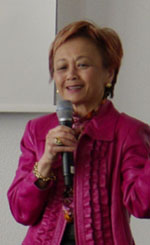In perfect accord … EURORDIS and Canadian rare disease alliance CORD agree on common goals via a Memorandum of Understanding
January 2013
CORD President Durhane Wong-Rieger commented on the partnership: “This Memorandum offers both a strategic and a practical opportunity for CORD. CORD has been operating since 1995, but it has only been in the past six years that it has played a significant role in affecting Canadian policy on rare disorders. CORD has benefited tremendously from the leadership of EURORDIS and the inclusion of all the rare disease communities in its activities. Canada benefits from the EU regulatory and policy frameworks. There is no option for rare disorders but to work together, and we anticipate with this partnership that CORD will contribute even more effectively to the “internationalization” of rare disease research, treatment, and quality of life”.
EURORDIS has been solidly established for 15 years and since its inception has championed pioneering legislation and policies in the European Union (EU), such as the EU Regulation on Orphan Medicinal Products (EC) No 141/2000 in 1999 and the Commission Communication in 2008 as well as the Council Recommendation on an Action in the field of Rare Diseases in 2009, which encourages all 27 EU Member States to develop a common strategy for the prevention, care, diagnostics, research and social services for rare disease patients. As such, Europe can serve as a model for Canada, which is currently developing its own rare disease policies, including the recent announcement of a regulatory framework for increasing access to treatments and information.
Concretely, the Memorandum enhances cooperation by CORD’s participation in the EURORDIS Council of National Alliances, Rare Disease Day, sharing national strategy experiences, and other possible joint actions. Beyond this, it specifies the common objective to strengthen the common international voice of rare disease patients and promotes a global approach through common position papers and collaboration in diverse areas including research, diagnostics, information, treatment, and quality of life.
EURORDIS signed a similar Memorandum of Understanding with the US National Organization for Rare Disorders (NORD) in 2009.
